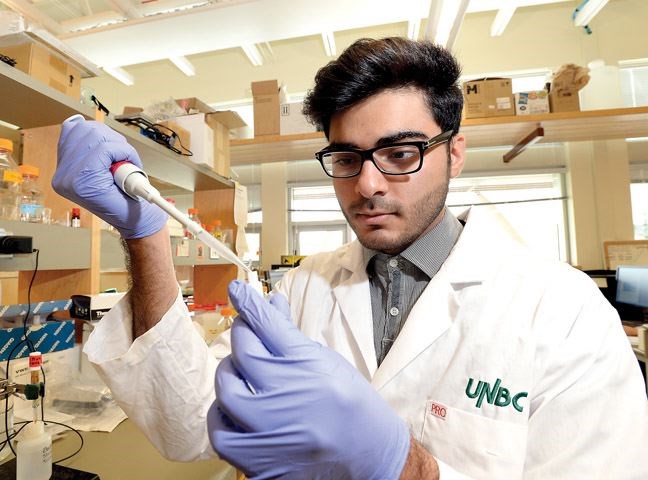When Faran Rashid was little, he was fascinated by all things science.
"By like Grade 5, I'd read every single science book in library at school," said the 21-year-old University of Northern B.C. student.
"That's all I did, was read."
He's maintained that love of research through the years, and was recently selected for one of five studentships -scholarships supporting student research -across Canada worth $10,000. Funded by the Brain Tumour Foundation of Canada, over the next two summers, Rashid will continue his research under supervisor Chow Lee to try and better understand brain tumours.
"I always wanted to work on something like this and now that I actually have the opportunity, it's a great feeling," said Rashid, who is starting his fourth year of an honours undergraduate degree in biochemistry and molecular biology.
"Cancer is a very complex disease," said Rashid.
"It's not like many other diseases. Two cancers, the only thing they would have in common with each other is that they grow very rapidly and they aren't stable.
"The brain is also a very complex organ," said Rashid, noting chemotherapy can be a limited treatment option with the potential to damage brain tissue. In addition some drugs can't cross the blood-brain barrier.
In particular, Rashid is studying wild mushrooms found in northern B.C. that could have anti-cancer compounds. Those same mushrooms are also the focus of research that was handed $52,000 from the Genome British Columbia Strategic Opportunities Fund in July.
When Rashid heard he was chosen - after a 15-page application and a project proposal that started in January - the first call he made was to his mother.
"It's amazing," he said.
"I love what I'm doing: the fact that you know you can potentially make a difference in someone's life by doing something that you love in the first place, there's no better feeling than that."
He spends his days focused on chemical analysis or treating brain tumour cells with the various compounds.
Rashid's favourite feeling is when he's in the lab and he gets a positive result - which often comes after days and even weeks of negative findings.
He remembers it happening most clearly when he first started his independent study on the mushrooms with Chow last fall as he was trying to separate compounds.
"I was trying to fine-tune something to get actual separation. I had spent months trying to get it to separate but it wouldn't work. One day I actually found the right solvent system," he said.
Once the crude samples are extracted from mushrooms, researches will test them on the brain cells.
If it looks like they have potential for killing brain cancer cells, they will be further purified and studied.
So that first step - figuring out the solvent - was crucial.
"I couldn't believe it because I'd been getting so many negative results. I did it three or four times, over and over again. When it finally clicked in my head, like I realized it actually worked, I just got up, I was so excited. I did a little dance and I sat back down."
It's those little victories in the lab, that motivate him every day.
"You know if this is successful that some day down the road you could actually have a positive impact on many people."
It also matters to Rashid that the studentships are funded by families affected by brain tumours.
His was created in memory of Taite Boomer, a 20-year-old University of Alberta student who died in September 2012, just eight months after he experienced his first symptom.



